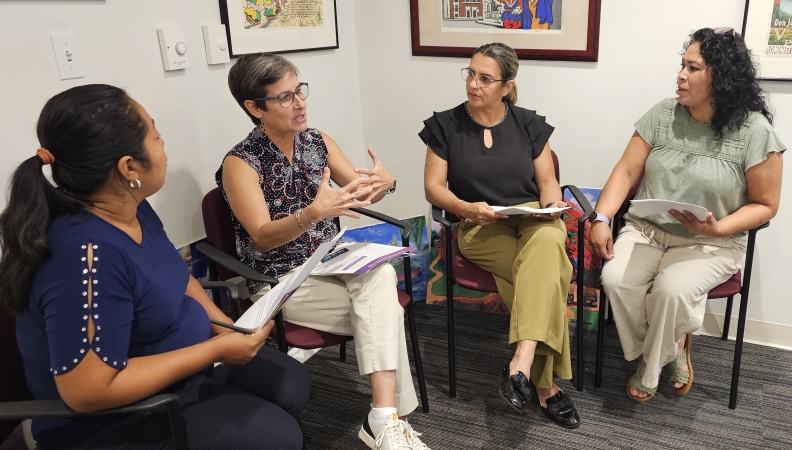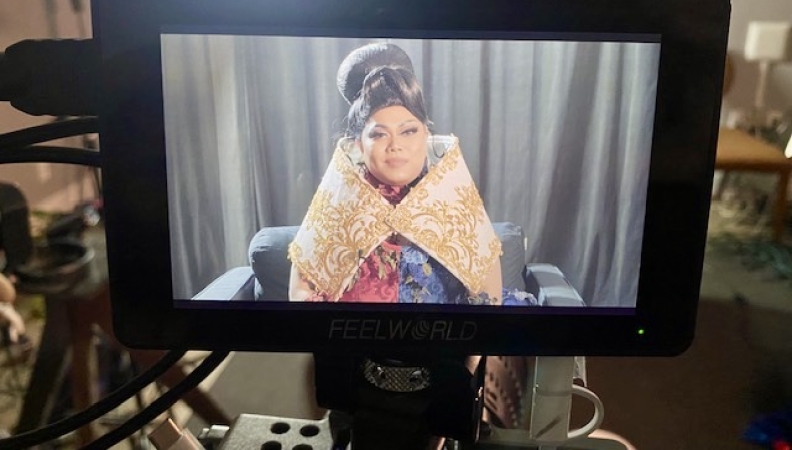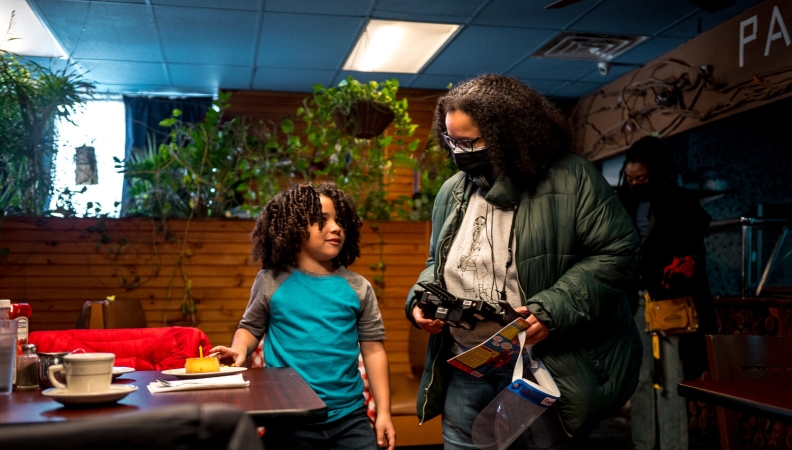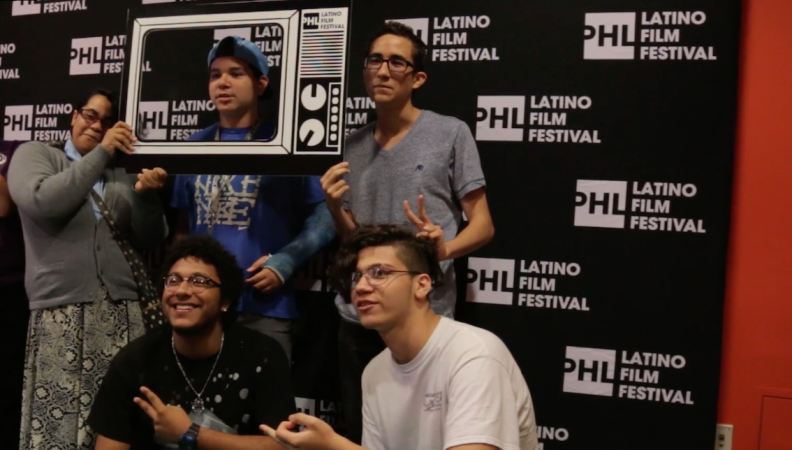How Spiral Q Leads Bold, Creative Activism
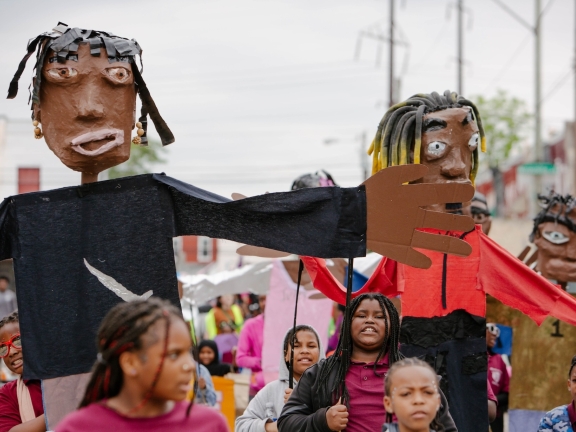
What does it mean to be in the streets of your neighborhood, existing in the spaces you’re usually not allowed to be in?
For nearly 30 years, Spiral Q has taken to the streets blending visual and performance art with community activism. Using artistic storytelling as a catalyst for social and political change, they amplify community voices with puppetry and pageantry. With events like the Peoplehood Parade & Pageant, a brilliant fusion of community art and power, they empower participants to harness their creativity to express civic concerns, to be loud and joyful. They inspire creators to take up space and make noise in their neighborhoods.
The following is a conversation with Spiral Q’s co-directors, Jennifer Turnbull and Liza Goodell. This conversation has been edited for context and clarity.
IPMF: What role does joy play in the activism space? Why is it important to bring joy to the forefront while tackling heavy issues?
Jennifer Turnbull: Joy is a rejuvenated state of being. You're celebrating, you're reflecting, and you're feeling uplifted. We all need that joy right now. So many people are hopeless because we've been doing all the things that our democracy says we should be doing to make our voices heard but they're being ignored. It's important for the activists right now to have a space to be together and to make art. Art is a therapy that allows us to access different parts of the brain. Joy is really important when doing the work because it helps us keep going. It gives us time to breathe, time to see each other, talk to each other, be human with each other, and connect with each other. As humans we tell our stories because they reveal and they connect, transferring that joy.
Video of Spiral Q's 23rd Annual Peoplehood Parade and Pageant
IPMF: How does Spiral Q's use of puppets and artwork with youth empower them to express themselves and reclaim their voices, particularly in spaces like their own neighborhoods where they're often marginalized or silenced?
Liza Goodell: When making puppets with young people in schools we focus on lifting up who they are and what they care about. Often, youth are silenced, their opinions aren't valued, and their stories aren't shared. With Spiral Q’s in-school program at Blankenburg Elementary School, the students are in the streets of their own neighborhood, carrying giant puppets that hold their stories that they created together out of cardboard boxes and things that they can find in their home. What does it mean to be in the streets of your neighborhood? Where the cars usually are, creating chants that are about things that are important to you. To exist in a space where you’re usually not even allowed to be in the streets. To be loud when you’ve been told to be quiet and to not yell in school. Now you can make noise.
Jennifer Turnbull: To be a young, Black or POC, working class or living in poverty person, wanting to thrive and express your cultural practices can inherently be a political act. Just wanting to sit on your stoop in your neighborhood and listen to loud music with your community can be a radical act. To do so without being policed, to not be whitewashed from the gentrification or affected by displacement. Being a youthful person with a voice is a political act, and it is important that their stories and their experiences have a place to exist, because they don't really exist in a lot of different spaces.
IPMF: How does creating art and metaphorical storytelling facilitate conversations about heavy, complex concepts? What about art opens us up to these conversations and understandings?
Jennifer: The framework for answering that question is that art is one of humanity's super communication tools. We're all hardwired for it. And so, when you come at it from an artistic perspective you're tapping into something that is deeper in your lizard brain because we communicated through movement before we were homosapien. Art is the most direct form of communication that we have, because it crosses all boundaries.
Liza: There's all these different angles that are brought to the work that makes it special. We started with ACT UP Philadelphia in the late 90s, using puppets to tell the stories and amplify the demands of the activists. The use of puppets, and being in the streets has spiraled out in these different ways over the last 28 years. We’ve had the long tradition of creating art for protests and that has been a throughline throughout all of our work. Supporting protests has led to us doing community parades all over the city.
Our biggest and longest running event is the Peoplehood Parade that we've been doing for 23 years. It is a celebration of the work of all of our partners, the youth, the activists and the neighbors all together in the streets. For our Peoplehood Parade and Pageant, we're often looking for the overlapping themes that exist. Overall, we found that white supremacy was something often discussed. And I remember this moment when it was a bunch of people from different groups informally talking about how white supremacy would be exemplified in the pageant. What does it look like? How do you talk about these big ideas that are intangible but people feel? The way that you can talk about things through metaphor opens it up for sharing how you might experience it, or how a variety of people might experience things.
The pageant often talks about a lot of very serious things. One year, it was in partnership with Trans March Philly and there were all these portraits of local people who had been killed for being trans. There were also scenes about various queer uprisings throughout history beyond Stonewall that people may not know about. We got feedback from parents that this pageant was a catalyst for larger conversations whether researching histories of resistance or how families and kids can stand up and protect trans people in their communities.
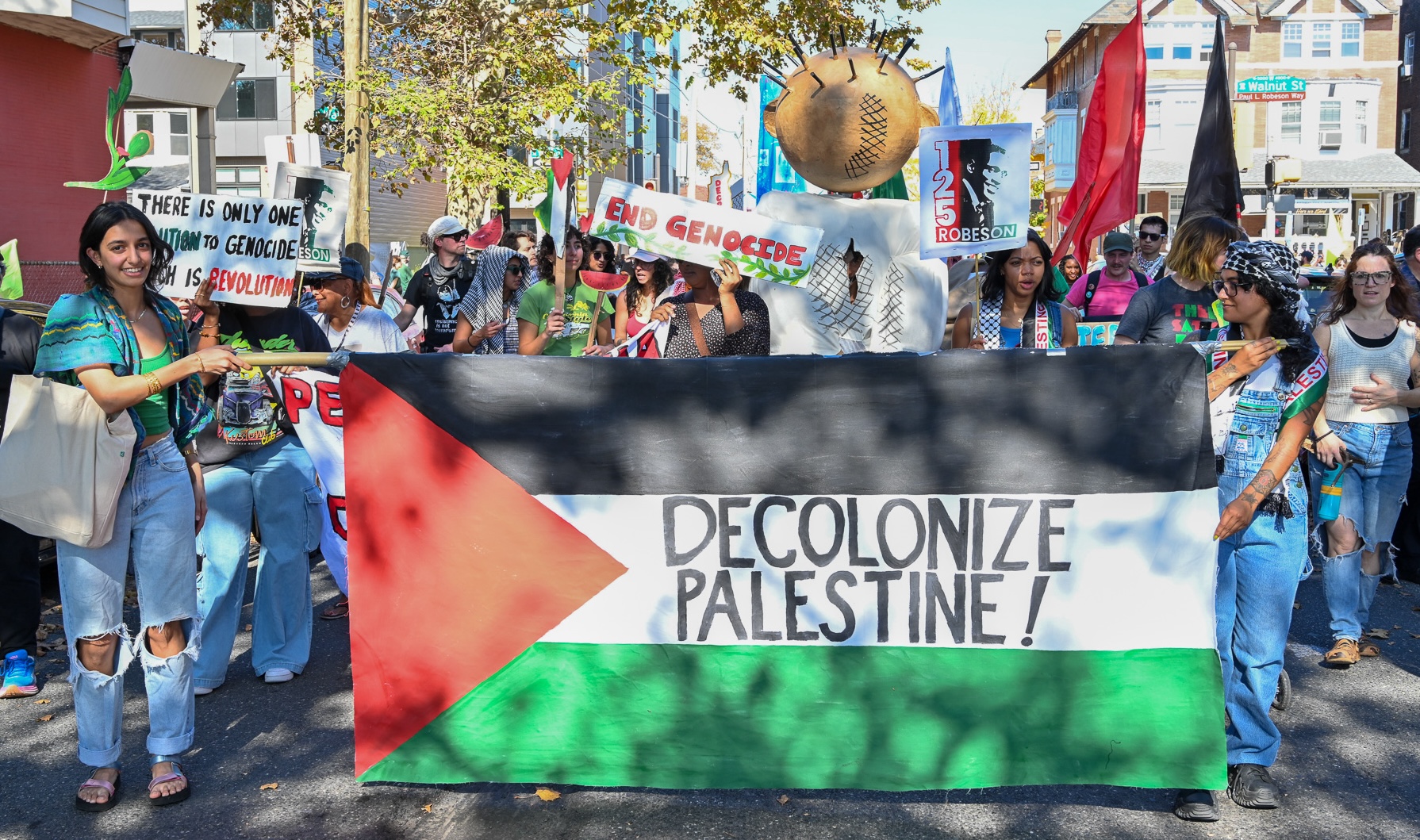
IPMF: How does the Peoplehood Parade serve to empower activist communities and how does the collaborative art-making process foster solidarity and dialogue among participants across different issues?
Jennifer: With the Peoplehood Parade we are centering our activist communities, and we're honoring them by putting them at the front of the parade. We facilitate and host 20 art builds leading up to the parade where our activist communities can come and make work that helps to galvanize, express, and tell the story of their campaigns and direct actions for use in the parade and for use in their own future campaigns.
Through the creation process we're able to convene people across issues to work side by side in the same space. There's an organic cross-pollination that is happening. There's seeds of solidarity building, because they're listening to each other and having conversations while they're making art. The space that is made within the artmaking is a really powerful tool for the ways that we're connecting people, having them hear each other's stories. That's a really important part of the work.
Liza: Recently, we've committed to helping organizers fighting for the people of Palestine. Our communities say they need the space to be making art right now not just to lift up their messaging and tactics but for their mental health. These art builds are important times to be together with other people who are really devastated and feeling powerless about what's happening. Beyond all the organizing that's happening in the streets, to have the quietness and the focus of the art-making together.
IPMF: Why is having a space for this art creation important? What does Spiral Q need to continue the work?
Jennifer: I would like to highlight that between both of our core programs, Peoplehood and our Justice Works program that happens throughout the year, it is really important that we have enough studio space, and we just don't have that right now. We are fortunate enough to be able to share a space with our artist landlord, expanding into the entire warehouse for larger production times like Peoplehood and from time to time throughout the year but it just isn’t as much as we actually need.
We're in the middle of figuring out how to purchase our own building so that we don't get displaced again, for the third time. We don’t want to be displaced from the places and the community that we have built deep relationships with. Because social capital is the original capital, and those stories are data points for connection, for people to understand what is happening in the lives of our folks.
Photo Credits: Spiral Q, Rachael Warriner
